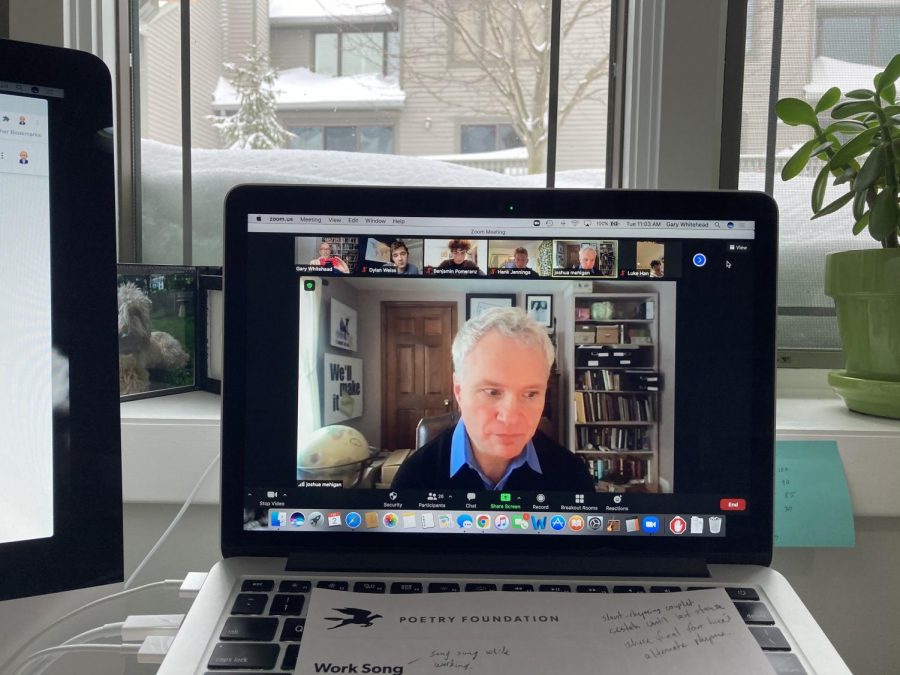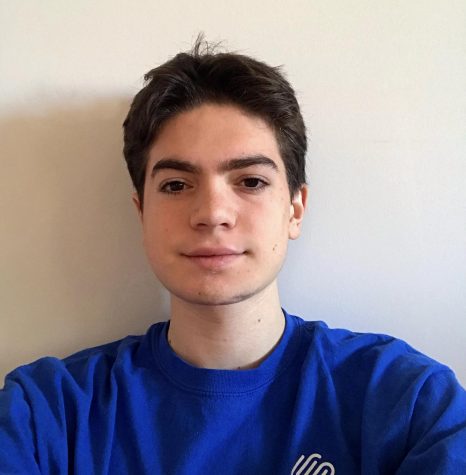Poet Joshua Mehigan Visits AP Lang Class
February 5, 2021
“This fastening, unfastening, and heaving— / this is our life. Whose life is it improving? / It topples some. Some others it will toughen. / Work is the safest way to fail, and often / the simplest way to love a son or daughter.” These are the opening lines to “Work Song,” a poem by Joshua Mehigan (pronounced MEE-GIN), a widely published and award-winning poet, creative writing professor, and last year’s Visiting Artist-in-Residence in the English Department at Northwestern University, who this week visited one of Mr. Whitehead’s AP English Language and Composition class Zooms.
In Whitehead’s three AP sections, students have been engaged in a unit surrounding “work and the workplace.” One of the works analyzed by students was Mehigan’s poem and, through of magic of Zoom, Mehigan was able to visit and speak with Mr. Whitehead’s students on Tuesday, February 2nd, discussing his work and process as well as answering students’ questions about his poem.
As a former AP English Language and Composition student myself, I think fondly back to the “Work” unit, a highlight of not only my junior year but of my academic experience as a high school student. I thoroughly enjoyed its multifaceted approach to concepts of labor and employment, and even wrote my own collection of poems as a final project. Hearing of Mehigan’s visit to Mr. Whitehead’s Period 8 class, with invitations extended to students in his other periods to visit, I was not only ever-so-slightly jealous of this year’s students, but understood how impactful a visit from Mehigan must have been to those engaged in the unit, providing perspective on and wrapping up a series of vastly different yet thematically interconnected works. This year’s unit consisted of studying Herman Melville’s “Bartleby the Scrivener,” Peter Spiro’s poem “Work,” Joshua Mehigan’s poem “Work Song,” Joe Weil’s poem”Painting the Christmas Trees,” Daniel Orozco’s short story “Orientation,” Hananah Zaheer’s story “Fish Tank,” and Eric Ormsby’s essay “On the Sagacity of Janitors,” another favorite of mine. The unit culminates with a Socratic seminar this week. I distinctly remember Mehigan’s poem’s cascading rhythm, mirroring the poem’s musical title, especially clear in series of lines like “That man, with nothing evil left to do / and two small skills to stir some interest up, / fits in the curtained corner of a shop” and “The best part of our life is disappearing / into the john to sneak a smoke, or staring / at screaming non-stop mills, our eyes unfocused / or standing judging whose sick joke is sickest. / Yet nothing you could do could break our silence. / We are a check. Do not expect a balance.”
Student’s who attended the unique event echoed this notion, explaining how they felt the experience impacted them or their learning experience. “[Mehigan’s visit] was a unique experience and a wonderful opportunity to learn the behind-the-scenes of poetry and publishing,” Dylan Weiss (’22) said. “Also a nice break with a ‘virtual’ field trip and guest speaker. Being able to first talk as a class and observe themes and deeper meanings in the poem and then being able to talk and ask specific questions about inspiration was very informative and let us have more appreciation for the poem. Overall, a really fun activity.”

Some students appreciated the chance to speak to a writer directly about his work. “I extremely enjoyed Mehigan’s visit!,” Jessica Lee (’22) said. “One thing I feel like we miss in school a lot is conversations with people about their careers or life experiences. It was nice that even during virtual school Mr Whitehead was able to give us the opportunity to talk to and ask questions of Josh Mehigan about his poem. It also helped to put our ‘work and the workplace’ unit into perspective a little. I love asking questions! I’m very curious, so opportunities like these are invaluable to me as a student.”
Whitehead, who does not know Mehigan personally, arranged for the poet’s visit simply by asking. “I reached out to Mehigan via Facebook Messenger, explaining to him that I was teaching his poem in a unit …and that I thought students would enjoy hearing the author talk about his poem,” Mr. Whitehead said. “Mehigan was gracious and accepted my invitation. During his visit, he read the poem to the class and then took questions, speaking about the origins of the piece, the narrative point of view, his father as inspiration for a character in it, and the structure and musicality. Students posed questions and Mehigan responded over the course of the period. It was terrific.”
Mehigan’s poem, “Work Song,” and his other work can be found here.

















































































































































